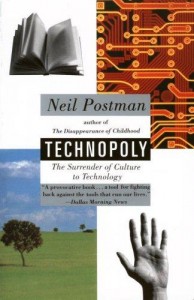 Science fiction has long preoccupied itself with themes of technology run rampant. From Stanley Kubrick’s HAL 9000, to James Cameron’s Skynet and the Wachowski brothers’ Matrix, we have no shortage of heartless artificial intelligences or indestructible machines revolting against their makers, waging war on humanity. Cultural critic Neil Postman has another vision. The technological revolution he describes in Technopoly is far less dramatic but no less fatal than Hollywood’s offerings, and, most alarmingly, it is already well under way.
Science fiction has long preoccupied itself with themes of technology run rampant. From Stanley Kubrick’s HAL 9000, to James Cameron’s Skynet and the Wachowski brothers’ Matrix, we have no shortage of heartless artificial intelligences or indestructible machines revolting against their makers, waging war on humanity. Cultural critic Neil Postman has another vision. The technological revolution he describes in Technopoly is far less dramatic but no less fatal than Hollywood’s offerings, and, most alarmingly, it is already well under way.
The first argument Postman makes concerns our adoption not only of new technologies but the modes of thought they necessarily engender. “New technologies alter the structure of our interests: the things we think about. They alter the character of our symbols: the things we think with. And they alter the nature of community: the arena in which thoughts develop.” A people reared on epic poems, recited by bards, is fundamentally different than one with a printing press and easy access to printed knowledge; the inventions of steam engines, telegraphs and photography all likewise alter the relationship between a people and information. But these technologies came gradually, were not instantly adopted by every society and often had sufficient periods of time between their inventions to allow for checks and balances to evolve. Those societies still able to exercise at least a measure of control on the flow of information Postman terms technocracies.
Technopoly is a different state entirely, one measured not by a specific material advancement but by a profound shift in our relationship with technology.
We had learned how to invent things, and the question of why we invent things receded in importance. The idea that if something could be done it should be done was born in the nineteenth century. And along with it there developed a profound belief in all the principles through which invention succeeds: objectivity, efficiency, expertise, standardization, measurement and progress.
Postman is not a Luddite and this is no mere rant against technological progress. He is quick to acknowledge the incredible gains in quality of life – marked by widespread access to healthcare and education – that have been the fruit of these principles, but he is too astute a social observer to believe they have come without a cost. One such cost is a series of unchallenged beliefs:
These include the belief that the primary, if not the only, goal of human labor and thought is efficiency; that technical calculation is in all respects superior to human judgment; that in fact human judgment cannot be trusted, because it is plagued by laxity, ambiguity and unnecessary complexity; that subjectivity is an obstacle to clear thinking; that what cannot be measured either does not exist or is of no value; and that the affairs of citizens are best guided and conducted by experts.
A culture with these beliefs would have a hard time appreciating art or religion, would see no benefit in literature beyond entertainment, and would lose any meaningful distinction between knowledge and wisdom, the latter being based to a far greater degree on things like judgment and subjectivity. Finally, such a society is apt to confuse technological progress with moral progress, or, even more frightening, to content itself with technological progress.
And technopolies do all of this without drawing attention to the shift. “Technopoly eliminates alternatives to itself in precisely the way Aldous Huxley outlined in Brave New World. It does not make them illegal. It does not make them immoral. It does not even make them unpopular. It makes them invisible and therefore irrelevant.” Another way of posing Postman’s question: Alexis de Tocqueville once observed that America’s politics were of the printed page. That characterization would be laughably inaccurate today, when the politics of the West play out on the Internet and on television sets. This transition is momentous and highly consequential, and Postman wishes to draw our attention to it.